7 Awesome Tips for Traveling in Another Language
Traveling in another language can be intimidating for so many people.
What exactly do I mean by this?
Well, traveling to a country where English is not spoken or not widely spoken.
I’ve had moments where some local is rattling off in Italian, Spanish, French or Turkish and I’m quite sure I’ve looked like a deer in the headlights.
Uhhh…huh?
How do you deal with this?
What are some tips to help you break down the language barrier?
Because, in my opinion, you shouldn’t NOT travel to a destination just because they don’t speak English.
So I’m going to offer up some tips on traveling in another language AND how to have fun with it.
Because I’m betting that these moments of “conversing” with a local will be some of your favorite travel memories.

Learn a few words in the local language
I think it’s a great idea to learn some of the basics such as hello, goodbye, please, thank you and you’re welcome.
Even if your pronunciation is off a bit, don’t sweat it.
The locals will appreciate your effort — even if you completely butcher their language.
It’s also good to know the words for entrance, exit, toilet, bus stop, train station, water, beer, wine, food (or certain types of food).
Again, don’t be a wallflower when it comes to saying the words.
Don’t be concerned with how good or bad your pronunciation is.
Just try.
Many locals will repeat it — the proper way — so you’ll get an education.
And learning something new is always a good thing.

Use an app or a language phrase book
Have an app on your phone for doing some translations, just in case.
Google Translate is one of the best language translators to use and many fellow travelers swear by it.
There are other apps out there including language specific dictionaries which is something I always download onto my phone before I leave the country.
Apps such as SayHi and iTranslate get high marks from fellow travel bloggers as well.
And these are all free.
Babbel and Duolingo are good apps to have so you can learn a bit before you go and have it with you as you travel.
If you’d rather have something on paper, then try a pocket-sized language phrasebook.
I’m a fan of the Lonely Planet guides as they contain practical words and phrases.
Since traveling in another language can be intimidating, having some sort of “reference” crutch is a fabulous idea and it will give you some peace of mind — as well as boost your confidence. 🙂

Speak slower, not louder
Just because someone doesn’t speak English doesn’t mean they’re deaf!
So if you meet a local or another traveler who speaks or understands a wee bit of English, don’t yell at them.
Simply speak a little slower.
Speak clearly.
Avoid slang and contractions.
So instead of saying “I’m going to Verona” say “I am going to Verona”.
Keep it simple and concise.
Use basic language.
Now is not the time to show off your PhD education.

Use exaggerated gestures and facial expressions
Yes you will look like a dork.
And the local you’re talking to will also look like a dork.
It’ll be an international dork fest.
But who cares.
Exaggerated gestures and facial expressions will ultimately get your point across.
This is what matters most.
Both of you will probably end up laughing your asses off.
And memories will be made.
You’re welcome.
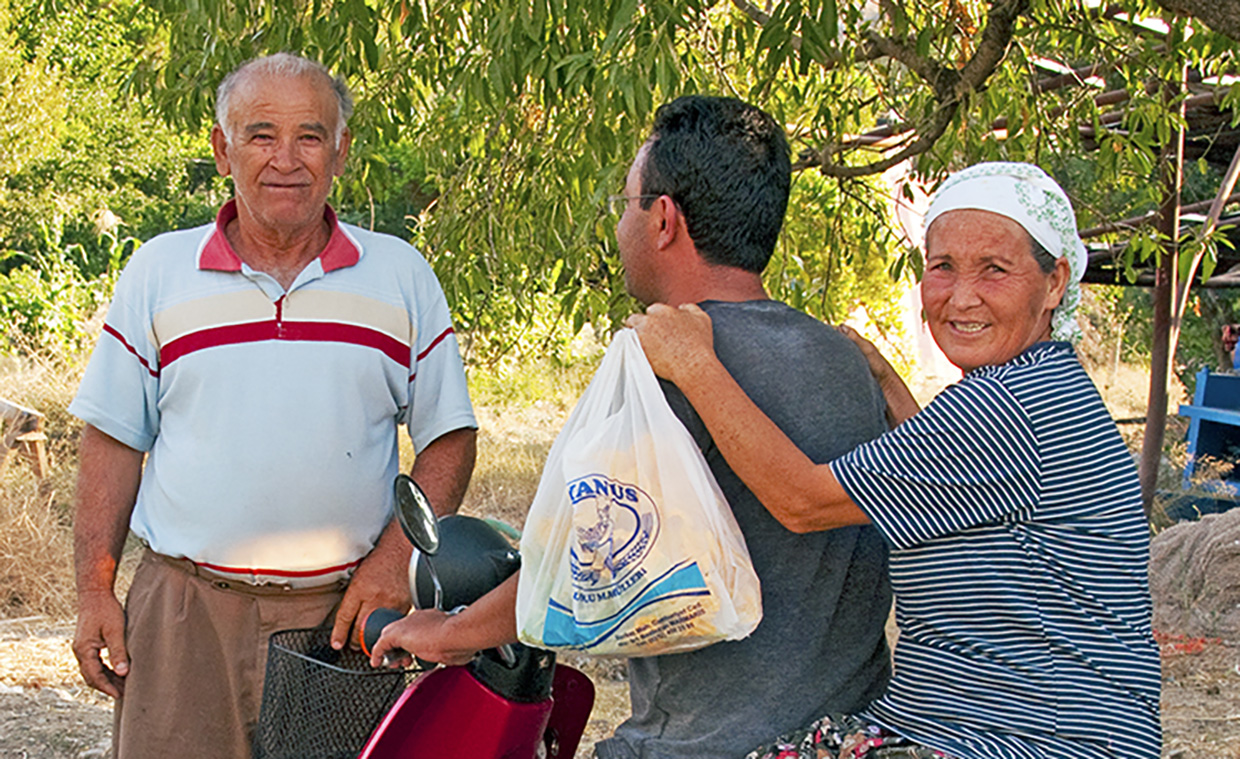
Be aware of certain gestures
Do watch out for certain gestures that may mean something completely different in the country you are visiting compared to back home.
Typically a good country guidebook will have some information on this so you don’t make an ass of yourself — or get your nose punched in!
Always do your homework before you go to avoid any international incidents.
We don’t want to hear about you on the nightly news.

Widget not in any sidebars
Know that the older generation probably won’t speak English
One good tip I like to toss out as a reminder is that you are more likely to find that the younger generation may speak some English.
The older generation?
Not so much.
Keep this in mind as you travel.
Another tip is to know that you may find English speakers more readily in larger cities versus smaller towns or in more touristy destinations versus off the beaten track places.
And some countries — such as the Netherlands, Germany and many Scandinavian countries — have more English speakers than some of the other European countries.
Every Dutch person I’ve ever met on my travels speaks pretty damn good English — even if they tell you they don’t.
However, I still recommend knowing some words in that country’s language — even if they do have a large percentage of English speakers.
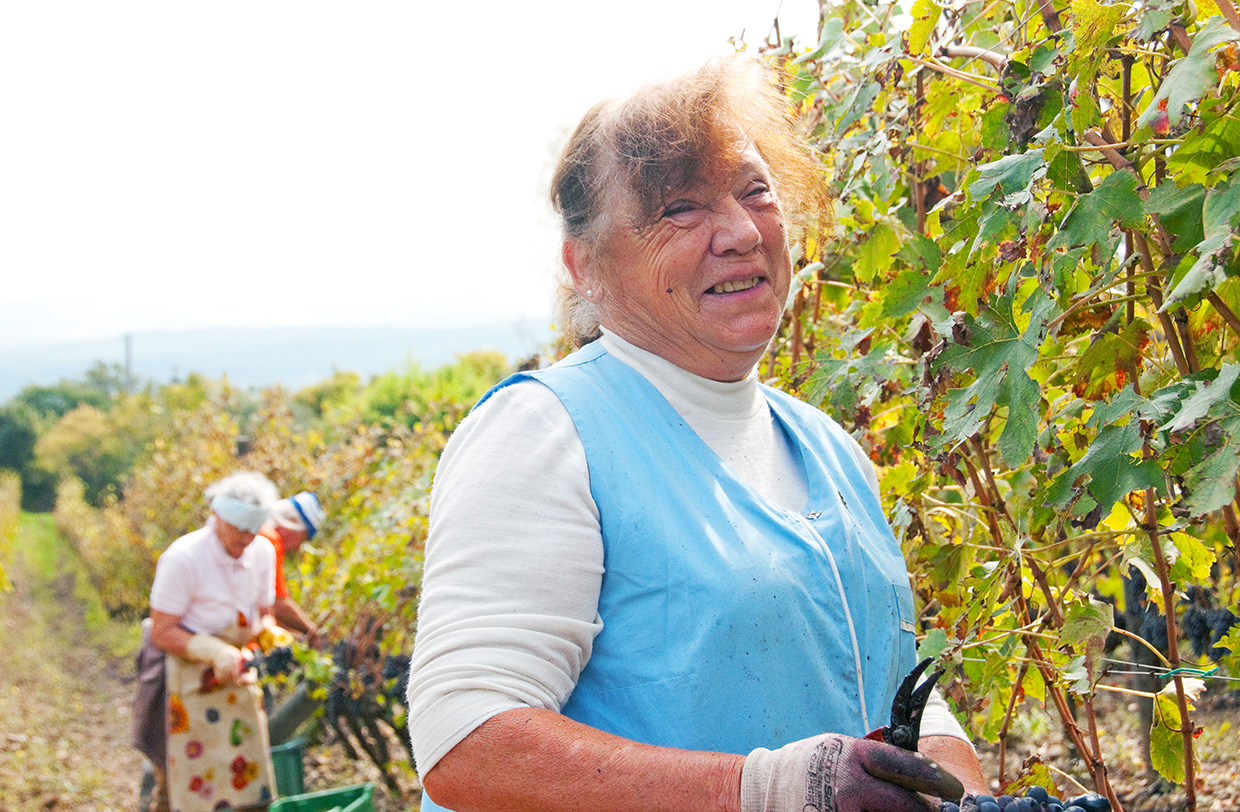
Have fun traveling in another language
Yes, there are times when you’ll feel so frustrated that you can’t understand what a local is saying to you or that the local can’t understand what you are saying that you’ll want to cry — or scream at the universe.
You’ll so wish you started to study Spanish or French or German when you were 5 to prepare you for this moment.
I’ve been there.
But really, traveling in another language can be fun.
And it’s a wonderful opportunity to learn — and to teach.
It’s a fabulous way to connect with the locals.
Pack your patience.
Look like a dork and sound like one too.
Open your mind to learn a new word or 2.
And become a teacher for a moment.
Above all — keep your sense of humor.
Smiles and laughter are universal.
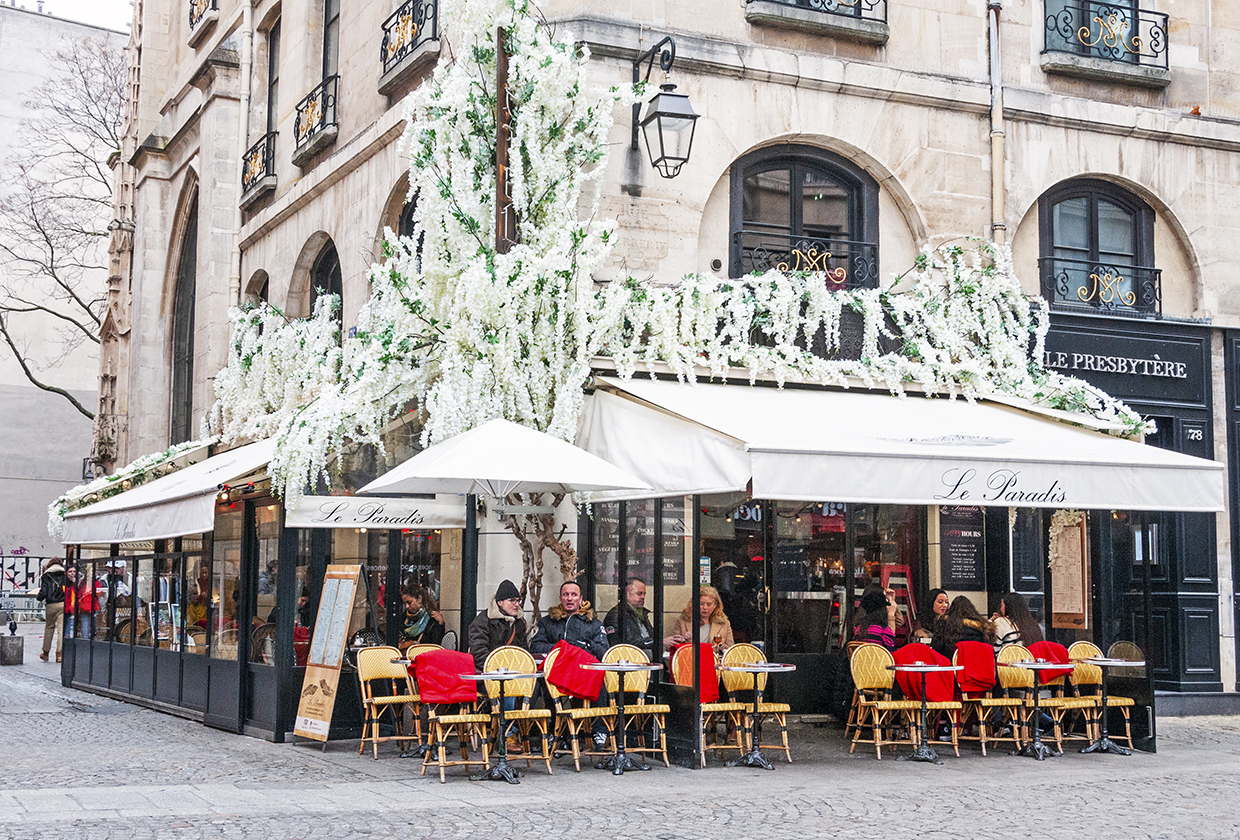
My favorite “traveling in another language” stories
One of my favorite stories comes from my time traveling in Turkey.
I was staying at Karia Bel’ Hotel in Bozuburn — one of my favorite spots on the planet.
The staff of this boutique hotel are wonderful.
I had come back from town and walked past the laundry area where about 5 or 6 of the staff — men and women — had gathered toward the end of the day.
They invited me in to eat a snack with them — using a couple of words they knew in English and hand gestures and many smiles.
We “conversed” in a mix of English, Turkish (I had learned a few words), hand gestures and facial expressions.
One of the girls left the group and came back with what looked like a melon of sorts — kind of a cantaloupe looking melon.
She held it right in front of my face, between her hands, and her eyes grew wide (she was an expressive young lady) and said loudly, “English!”
She wanted to know what this was called in English.
I wanted to laugh because of her facial expression, but I gave her an answer telling her it was a melon.
Her co-workers laughed as did I.
It’s one of those moments that sticks with me — and makes me smile.
Another conversation that stands out in my mind is one I had with Corrado, the farmer at Casale dei Frontini agriturismo just outside the town of Todi.
Corrado didn’t really speak any English, but he knew a few words.
I had been learning some Italian, but it was very limited.
But he and I had a conversation about nature — la natura.
How important it was to us, what it meant to us, and how we both loved it.
Seriously.
We really understood each other.
Not from the words per se, but from the context, the gestures and the facial expressions.
It’s pretty amazing what you can communicate when you can’t rely just on words.
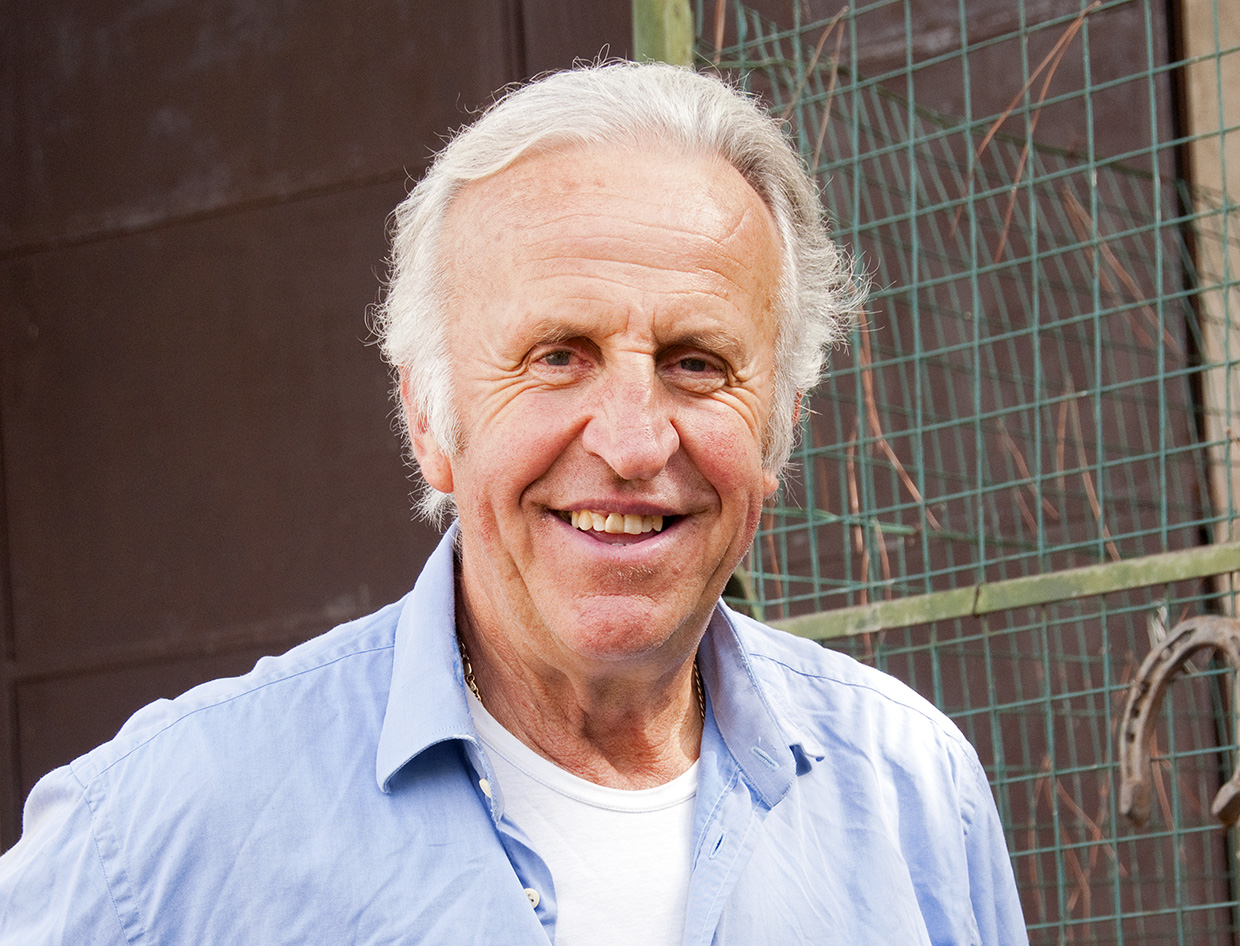
One last travel story…
On a trip to Tuscany a few years ago, the hostess at my agriturismo set up a vineyard visit for me to a small family-run winery called Sante Marie di Vignoni.
Now the young girl, Pricilla, the daughter of the owner/winemaker, spoke a wee bit of English so she talked me through my tour and tasting.
But her father, Franco, wanted to show me where and how he made the wines — the steel vats of grapes, etc. — and he didn’t speak any English!
He insisted on taking me on a tour, showing me around.
And, you know what?
I understood more of what he said than I thought I would.
He rattled on in the most beautiful language on the planet — Italiano — about the wine making process and I nodded my head, getting the gist of what he was telling me.
Visiting Sante Marie di Vignoni is one of my fondest memories of my time in Tuscany that year — because of Franco and because of Pricilla and, of course, because of Pricilla’s nonna who I somehow communicated with as she harvested grapes in the vineyard.
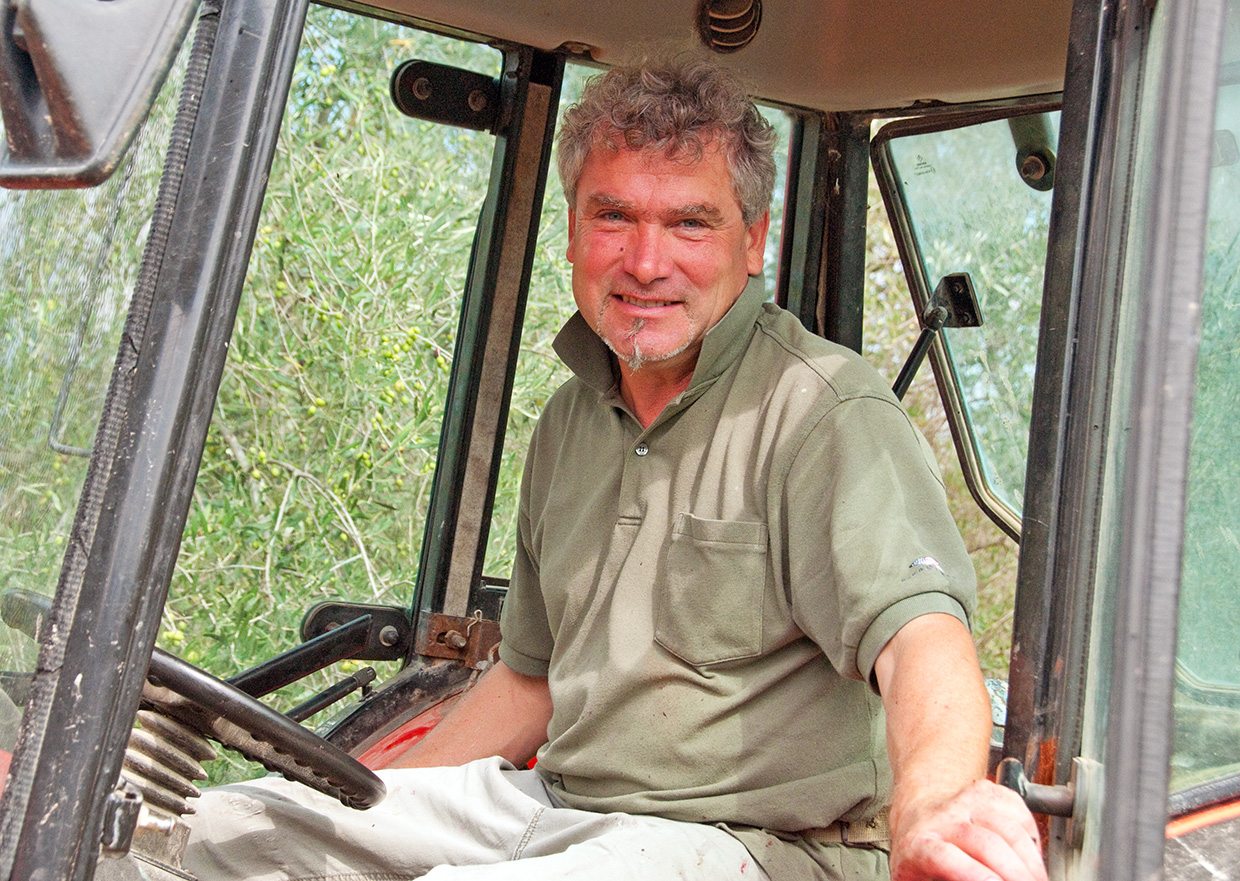
My favorite language resources
I’m a fan of learning new languages although, sadly, I am NOT fluent in a second language.
However I like to know more than the basics when I travel.
And I’ve found Fluenz to be a fabulous program.
So if you want to learn a new language — even just a wee bit — I highly recommend it.
If you just need a translator as you go, then try the following:
- Google Translate
- Say Hi
- iTranslate
- Ascendo Language specific online dictionary
- Babbel
- Duolingo
- Lonely Planet Phrasebooks
- Fluenz — for those who want to learn a bit more
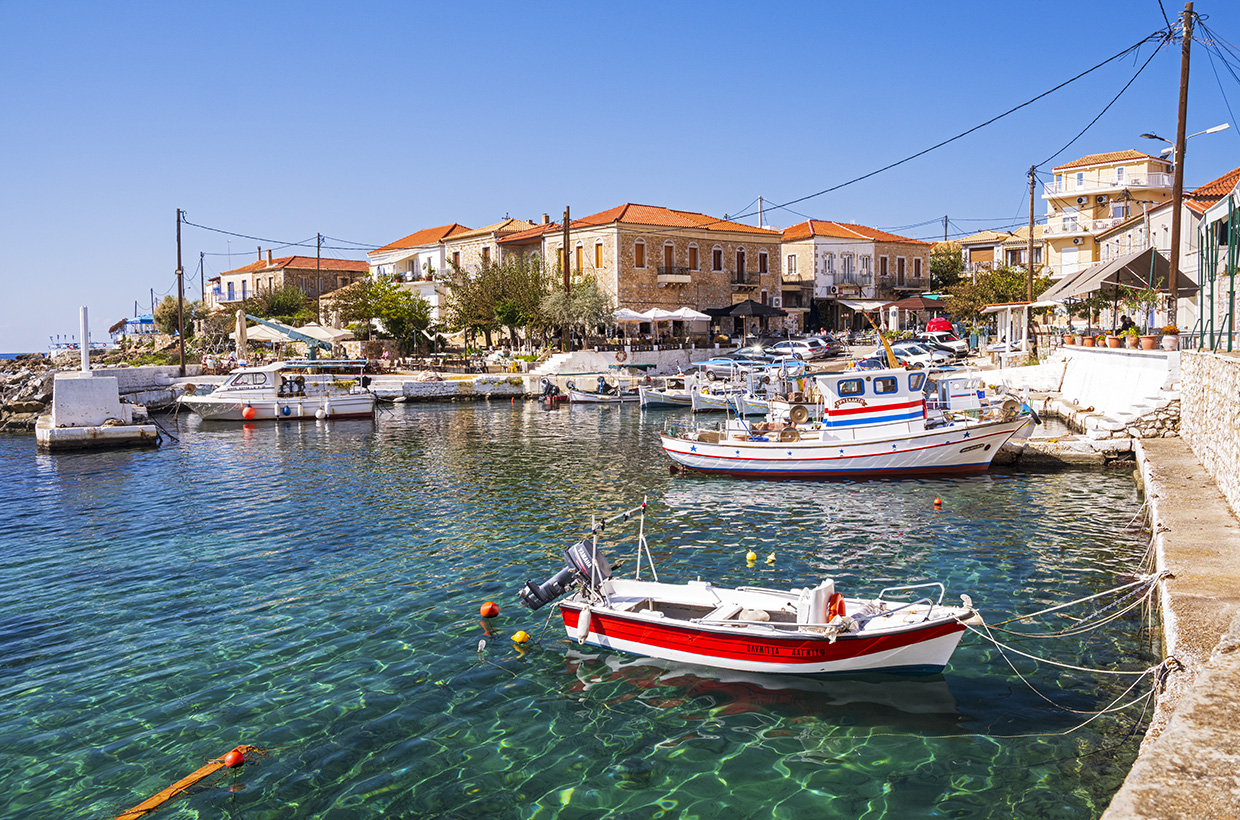
Disclaimer: This post contains affiliate links. This means I will earn a commission – at no extra cost to you — if you click on the link and purchase anything from these trusted companies. It helps Wander Your Way, a small business, stay in business. Thanks for your support!
Like it? Pin it!
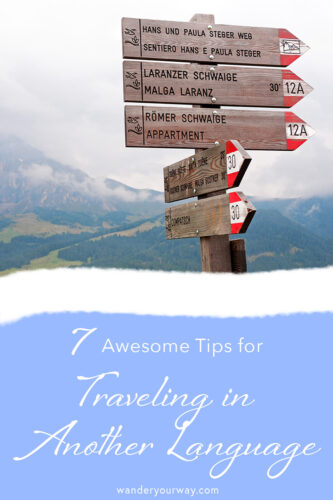
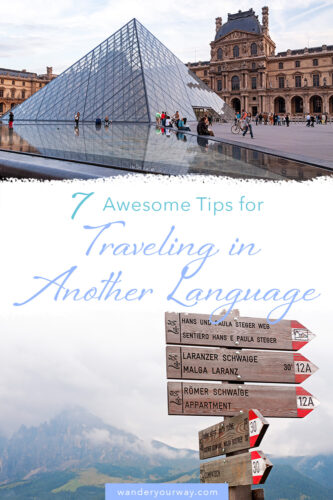
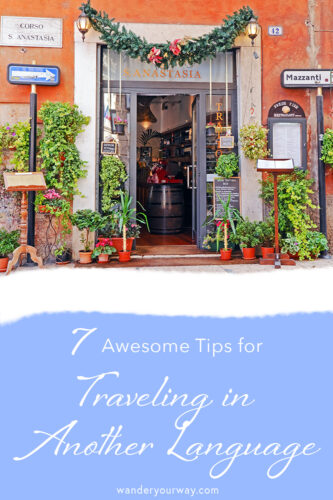









Such a great reminder. Traveling to countries where English isn’t the default is the best antidote for my American-centered worldview.
I vividly remember landing in Tokyo and instantly being rendered illiterate (and a six-foot tall, blonde outsider), literally relying on the kindness of strangers.
One of the best compliments I ever got was from a Frenchman on the Champs Elysee who said my French was “pretty good”, as he handed me the gelato I’d ordered. (Little did he know how many times I had practiced that interaction before I stepped up to the plate LOL)
My second language wins and fails are some of my most cherished travel memories – humbling in the best possible way.
I love this so much, Rachel. These moments are some of my most cherished travel memories too.
Great, practical tips and a really entertaining post! We’re going to adopt some of these as we struggle with our backpackers Spanish in South America 🙂
You’ll be fine. And I’m guessing you’ll get better at your Spanish as you travel. Have fun!
Great post ! And I so agree, that not speaking a language, should not stop anyone to visit a certain country. Speak slower, not louder made me laugh . That’s my husband when he travels to Poland with me ( to visit my family ), and talks to my Dad who doesn’t speak English haha.
I always see and hear this — people just speak louder. I believe you always find a way to communicate. Thanks for the comment, Aga!
Definitely agreed on your point about looking to younger people when you need to find someone to translate. One of the most hilarious parts of traveling in a country where you don’t speak the language is when small children know English but are too shy to talk to you. When I went to Myanmar, little kids were constantly running up to me, shouting, “Hellogoodbye!” and then running off as fast as they could. It was so hard to find anyone I could communicate with, I really wanted to call them back and ask for help! I met a seven year old girl in Mandalay who spoke an astounding FIVE languages. She was trying to sell bracelets to tourists and had learned as many languages as she could for her sales pitch.
Wow! 7 years old and can speak 5 languages! Smart little girl!!
Great post Lynne! Loved the bit about exaggerated gestures!
Thanks, Lisa.
Great post, will definitelly use it! Thanks for the tips
You’re welcome, Albína!
Perfect timing! We’re exploring ways to learn Portuguese. I wasn’t previously with Fluenz but will check it out.
I really like it. It’s not the cheapest, but the investment is worth it. It helped me so much with Italian. Best of luck, Mindi!
I love this post! and yes, you are absolutely right, traveling in another language is a lot of fun, and gives you more laughs than anything else. I am lucky enough to actually be fluent in a few languages, which makes it easier to understand even more… still, when I travel in countries where my knowledge of the local language is limited, hand gestures mixed with butchered half-sentences or simply words thrown seemingly out of context give us all opportunities for lots of laughter – and I learn a lot. Love to see posts from people like you, who enjoy “traveling in another language”. 🙂
Thanks for this lovely comments, Emese. Good to know that you too have a sense of humor when trying to communicate. Laughter and smiles are universal!!
Fantastic! We’ve traveled a bit in Europe and Asia and we find the after you loosen up a bit (and get over the jet lag) you usually manage alright. We were a bit surprised in Italy (including Rome) how few people spoke English, but have been in other areas where we wouldn’t have expected it, so you never really know. One of my words I always try to learn is “I’m sorry,” because you never know when you might need it. Some of the tonal languages get pretty tricky with the translators but we’ve haggled with people typing numbers back and forth on calculators or phones before. Once I opened my phone to google, handed a woman my phone, and pointed to a food to find out what it was.
I think there are so many ways we can find to communicate when we have to! And I would agree that I’m sorry or excuse me is a good one to know.